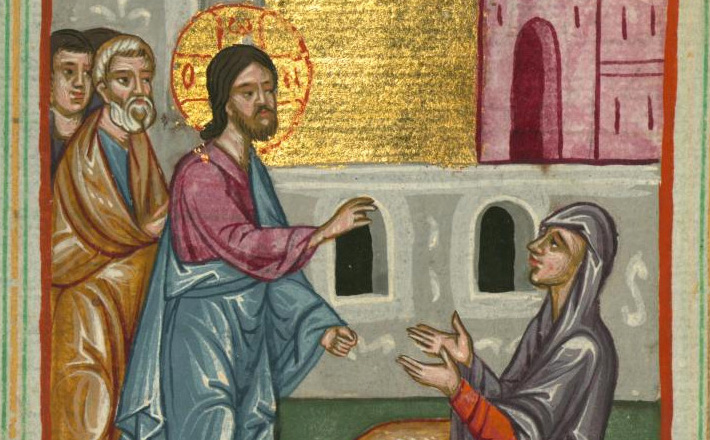Commentary on Matthew 15:[10-20] 21-28
Jesus’ encounter with the Canaanite woman is unsettling.
Jesus is less than eager to help this woman, explaining that his mission is first to the house of Israel. However, Jesus is the one who has left Jewish territory and invaded this woman’s world. Furthermore, this Canaanite woman — an unclean, outsider — demonstrates that she has a better grasp of Jesus’ identity than the hand-selected disciples do at this point in the narrative. Jesus’ encounter with the Canaanite woman unsettles boundaries and calls into question definitions of clean and unclean.
Jesus has entered into Tyre and Sidon where the Canaanite woman instantly greets him. It is remarkable that enough word about Jesus had spread to this region that this woman would somehow know who Jesus is (cf. Mark 3:8). The text does not say that he performed any signs in Tyre and Sidon before meeting her (see 11:20-24), yet she somehow recognizes him, not just as a roaming healer but as a rightful king.
The woman greets Jesus as the “Son of David.” Her recognition is all the more remarkable because the disciples have been a bit slow in recognizing Jesus. In Matthew 14, after the walking on the sea, they do recognize Jesus as the Son of God, but it is not until 16:16 that Peter declares Jesus as Messiah. Yet, this woman hails Jesus as the Son of David, begs his mercy, and entreats his power over a demon that has “severely” possessed her daughter (v. 22). How is it possible that this woman has more insight into Jesus’ identity than his disciples? She is, after all, an unclean outsider, part of a people who are remembered as an old enemy of Israel.
Jesus’ response is, perhaps, the most perplexing piece of this narrative. At first, he does not say a word to her, but he refuses to send her away. Only after her persistence does he converse with her. Twice, he explains to her that his mission is first to the “lost sheep of the house of Israel.” Indeed, the narrative has emphasized that the “house of Israel” has provided Jesus with more work than one laborer could feasibly handle (9:35-10:6). The need in Israel is indeed great.
The disciples, too, seem to think that Jesus should stay focused on the needs of Israel. They kept telling him to send her away because they are tired of hearing her cries for help (15:23).
Perhaps, Jesus’ refusal to listen to the disciples gave the woman hope that her request would be heard. She does something that is significant in this Gospel: she kneels before him. The author of Matthew uses this action as one befitting a king. The magi, who are also Gentiles, are the first to offer worship to Jesus in this way (Matthew 2:2, 8, 11). The unrepentant slave bows before the king in the parable of unforgiving servant (Matthew 18:), and the mother of James and John kneel before Jesus as a king of a kingdom (Matthew 20:20). For the woman to treat Jesus in this manner is in keeping with her earlier declaration of Jesus as the Son of David.
Kneeling is not only a sign of kingship, but also recognition of power. There is a connection between those who kneel before Jesus and the healings that Jesus performs. A leper kneels before Jesus and asks to be made clean (Matt 8:2). A ruler kneels and asks for his daughter’s healing (9:18). At the end of this Gospel, when the resurrected Lord appears, the disciples bow before him, and Jesus says that all authority in heaven and earth is his (28:17-18). Bowing in worship also recalls Jesus’ command to worship only the Lord God (4:9). This woman kneels before one whom she recognizes as having authority not only to sit on the throne of David, but to wield power over evil.
Jesus’ response to her second cry for help includes a reiteration of his mission to the lost sheep of the house of Israel. He even likens her status as a Gentile to the status of the small, pet dogs who long to be fed from the table (15:26).
The woman, however, is not deterred. She claims a place in the household, but it is a not a position of privilege or even the position of an insider. She accepts the status of a family’s dog by claiming that even the dog enjoys crumbs from the table.
Her statement is striking. She places hope in what others have discarded. This Son of David has so much power that there is enough power for the house of Israel and more than enough left over for her. She is not trying to thwart his mission. She just wants a crumb, recognizing that even a crumb is powerful enough to defeat the demon that has possessed her daughter.
Jesus praises her faith. This woman seems to understand what the members of the household of Israel have yet to grasp.Jesus is not just hope for Israel, but hope for the world.
In the passage that immediately precedes this story, Jesus responds to challenges from the scribes and Pharisees by reframing the boundaries of clean and unclean. In 15:18, Jesus declares that what comes out of the mouth proceeds from the heart, and what comes out of the heart determines what makes one clean. What comes out of the Canaanite woman’s heart is faith — certainty that Jesus has power enough for Israel and power enough to save her non-Israelite daughter.
Her words demonstrate that the boundary separating her from the house of Israel must be reconsidered. With a faith so pure, how can she be deemed unclean? The encounter with the Canaanite woman prepares the reader for Jesus’ great commission to go and to make disciples of all the nations (28:20).
Reading Jesus’ encounter with the Canaanite woman during Pentecost reminds the church that God is constantly entering new territory and breaking boundaries. This God is in the unsettling business of meeting outsiders and granting them not just a crumb, but a place at the table.


August 17, 2014